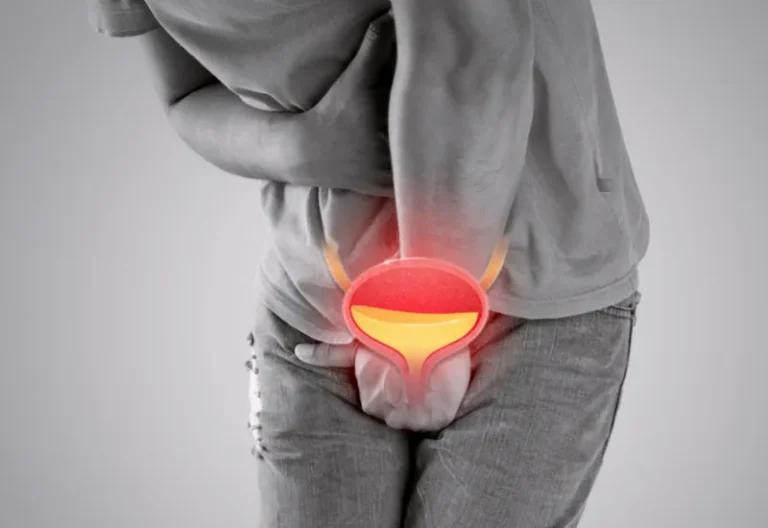Why is my bladder so weak all of a sudden? Sudden loss of bladder control resulting in urine leakage is common, but can be frustrating, embarrassing and can affect your quality of life.
Bladder control problems happen when your bladder muscles contract more than usual or don’t contract at the same time. If your bladder muscles contract with excessive strength, they can overpower your sphincter muscles. This results in urine escaping from the bladder into your urethra and out of your body uncontrollably.
There are several possible causes of a weak bladder, from minor to more serious conditions. Diagnosing the cause will help you find treatment. In the below article we will look at 7 possible causes and treatments.
💧 Urinary tract infections (UTIs)
A urinary tract infection is one of the most common causes of sudden bladder control problems. This can result in symptoms such as:
- Frequent urination
- Sudden urge to urinate
- Pain or burning during urination
- Urine leaks
Most UTIs affect the bladder and the urethra. These include cystitis (bladder infection) and urethritis (infection of the urethra). The most common type of UTI is an infection of the bladder.
💦 Overactive bladder (OAB)
Overactive bladder (OAB) is another condition that can cause sudden changes in bladder control. leading to an urgent need to urinate. Symptoms of OAB include:
- Urgency to pass urine
- Frequent urination
- Inability to hold urine (urge incontinence)
- Night time urination (nocturia)
This type of incontinence can develop over time, but can come on suddenly due to factors like stress, certain medications or changes in diet.
😞 Stress and anxiety
Emotional stress and anxiety can impact on bladder function, releasing adrenaline, which can interfere with bladder control. Stress can lead to symptoms such as:
- Frequent urination
- Urinary urgency
- Difficulty fully emptying the bladder
Anxiety is also known to trigger overactive bladder symptoms, leading to sudden bladder weakness. Learning to manage stress through relaxation techniques or therapy may help improve bladder control.
💊 Medications
Certain medications have side effects that can impact bladder function, leading to a sudden weakening of bladder control. Some medicines can disrupt the normal process of storing and passing urine or increase the amount of urine you produce. For example:
- Diuretics increase urine production, leading to more frequent urination
- Anticholinergics can relax the bladder muscles, making it harder to control urination
- Antidepressants can affect the signals between the bladder and brain, resulting in urinary retention or difficulty sensing bladder fullness
If you’ve recently started a new medication and notice changes in your bladder control, consult a healthcare professional for medical advice, to determine if the medication is the cause.
🏥 Neurological conditions
Surprisingly the nervous system plays a large part in bladder function and bladder weakness can sometimes mean there is a neurological issue. Conditions like multiple sclerosis (MS), Parkinson’s disease or a spinal cord injury can cause nerve damage in the bladder, urethra, or pelvic floor muscles. This can result in symptoms such as:
- Urinary incontinence
- Urinary retention
- Frequent urination
- Difficulty starting or stopping the flow of urine
If you experience sudden bladder weakness along with other neurological symptoms, it’s important to seek medical attention promptly.
🙎♀️ Hormonal changes
Hormonal changes, particularly in women, can also contribute to bladder weakness. The lower levels of estrogen associated with menopause can cause the vaginal walls to weaken. If they deteriorate enough, the bladder is no longer supported and can fall into the vagina. This can cause urinary problems such as stress incontinence. Pregnancy and childbirth can also strain the pelvic floor muscles, leading to a sudden or gradual weakening of the bladder. Common symptoms include:
- Leakage during physical activities such as coughing, sneezing, laughing or exercising (stress incontinence)
- Increased urinary frequency or urgency
Pelvic floor exercises (Kegels) can help strengthen these muscles and improve bladder control.
🙍♂️ Prostate Issues
In men, prostate issues can play a significant role in sudden bladder weakness. An enlarged prostate gland can press against the bladder, leading to symptoms such as:
- Frequent urination
- Difficulty starting the urine stream
- A weak urine flow
- Incomplete bladder emptying
If prostate issues are contributing to your bladder symptoms, treatment options are available to relieve the pressure on the bladder. You may also be referred to a urologist.
📝 How to improve a weak bladder
A weak bladder can sometimes cause embarrassing situations, but fortunately, several treatments are available to help manage or even cure symptoms.
Lifestyle changes
Changes to your diet and lifestyle may be helpful in relieving symptoms like constipation. Increasing your water intake and eating a high-fibre diet can help to prevent straining during bowel movements. Maintaining a healthy weight for your body type puts less pressure on your pelvic muscles when you stand or walk. Obesity, especially around the abdominal adds to the pressure that can stress and weaken the pelvic floor.
Pelvic floor exercises (often called Kegel exercises)
Targeted pelvic floor exercises are the first line of treatment for bladder prolapse. This therapy strengthens the muscles that support your pelvic organs and may be the only treatment needed in mild cases of uterine prolapse.
To do Kegel exercises, tighten your pelvic muscles as if you’re trying to hold back urine. Hold the muscles tight for a few seconds and then release. Repeat 10 times. You may do these exercises anywhere and at any time.
Kegel exercises may be most successful at relieving symptoms when the exercises are taught by a physical therapist and reinforced with biofeedback. Biofeedback involves using monitoring devices that help ensure you’re tightening the correct muscles with optimal intensity and length of time. These exercises can help improve your symptoms, but may not decrease the size of the prolapse.
Muscle relaxant injections
Muscle-relaxing substances such as Botox can be injected into the bladder muscles to reduce overactivity, reduce urgency and urge incontinence.
Nerve stimulation
Treatments such as sacral nerve stimulation use mild electrical pulses to improve communication between the brain and bladder, reducing OAB symptoms.
Surgery
In rare and severe cases, surgery may be required involving bladder reconstruction or urinary diversion.
📝 Conclusion
Making some simple lifestyle changes can help strengthen the bladder and pelvic muscles and reduce bladder irritation to help improve OAB symptoms.
If symptoms persist despite making these changes a healthcare provider may ask you to keep a bladder diary for a few days to determine whether or not additional treatment may be necessary to help strengthen the bladder muscles and reduce bladder leakage.
Sources
- Overactive bladder – Symptoms and causes – Mayo Clinic
- Bladder Control: Types, Causes & Treatment
- Overactive bladder: A review and update – PMC
Medical Disclaimer
NowPatient has taken all reasonable steps to ensure that all material is factually accurate, complete, and current. However, the knowledge and experience of a qualified healthcare professional should always be sought after instead of using the information on this page. Before taking any drug, you should always speak to your doctor or another qualified healthcare provider.
The information provided here about medications is subject to change and is not meant to include all uses, precautions, warnings, directions, drug interactions, allergic reactions, or negative effects. The absence of warnings or other information for a particular medication does not imply that the medication or medication combination is appropriate for all patients or for all possible purposes.








